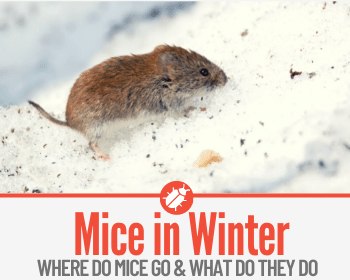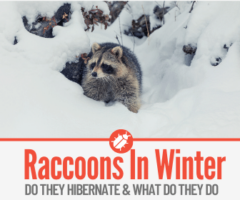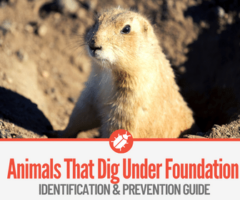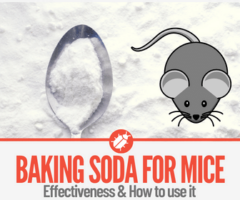 Wondering what are mice up to during the Winter? Do they Hibernate or come into houses during the winter to seek warmth and Food?
Wondering what are mice up to during the Winter? Do they Hibernate or come into houses during the winter to seek warmth and Food?
In this guide you will learn:
- If Mice are active During the winter & Where Do They Live in Winter,
- Can a Mouse Survive Outside in Winter or it will Freeze to death,
- How to Deal with Mice that may be coming in your house in Winter.
What Do Mice Do in the Winter?
When the Winter Comes and the temperature drops, mice will find a warm space to spend the long, cold winter.
Mice in winter do not hibernate, instead, they spend the winter actively looking for food, shelter, and trying to avoid predators, or the cat that you may have in your home.
Mice are still active during the winter.
Scarcity of food can actually cause mice to be more active during the winter months as they tend to have to go further than usual to find food.
However, in the cold a majority of their time is still spent within their nests as they can better control their body heat this way.
This is true for both mice outside and inside of your home.
This may make it seem as though mice are worse in the winter, when really they are just looking further for other sources of food. It may just be that you are able to see them more throughout the winter.
Can Mice Survive Outside in the Winter?
Unlike insects that tend to die off in colder temperatures, Mice can survive in the cold outside in their own burrows or nests that they create.
Mice do not die off in the winter. They can use anything from hay and grasses, to any old clothes or pieces of paper that they may find to build these heat trapping nests.
Mice in winter tend to live outside within things, as this can be a good insulator from the cold, or other predatory animals.
Mice can burrow into old stumps in the ground or into piles of wood or rock.
These will ensure that the nest will stay mostly dry and insulated from the harsh winds of winter.
Mice are one of the few animals that can be found in warm conditions as well as cold ones.
They are able to survive summers that are warm and humid in the United States Midwest, as well as at the tops of Cold Mountain peaks, like the Andes Mountains.
Do Mice Come into Houses in Winter?
Mice will indeed come inside your house during the winter in search of warmth and or food and are able to slip through some of the smallest cracks to get inside.
An adult mouse can fit through a hole or opening that is roughly as large as a United States dime.
If Mice get inside your house, they will most likely make their nests out of your way.
Most likely in corners that are hard to reach, or in spaces that might not have a high volume of traffic like an attic, basement, or garage.
They may also find food in these areas, which will keep them out of your way for the most part. You may not even know that you have mice until there are a lot of mice.
Especially in winter, make sure that you are cleaning frequently if you do find mice in your home as mice can carry many diseases with them and within their poop.
What Temperature is Too Cold for Mice?
Mice CAN freeze to death under the right circumstances. However, most mice in the winter are able to either build nests in which they can easily regulate their body temperature, or they find a warmer place to reside for the winter.
On the other hand, if you were to trap a mouse in a glue trap and leave them in a cold area with no protection from the elements, they will eventually freeze to death.
Think about how Humans have adapted to the cold weather; putting on extra layers of clothing, building shelters that keep them out of the cold, etc.
Mice are very similar in how they are able to adapt to and survive in the cold.
They will eat more to build up fat for the winter and they will build nests with materials that will keep the heat in such as cloth or newspaper.
Because of these adaptations, mice are able to survive in temperatures well below freezing.
On the flip side, because of the scarcity of food and proper building materials it is very unlikely that you will see a wild mouse in Antarctica.
Will Mice Stay in a Cold House?
The ideal temperature for mice is a lovely 75-90 degrees Fahrenheit.
Mice can still work just fine into freezing temperatures but their habits may change. They may consume more food to pack on fat for the winter months, or they may begin looking for areas to nest.
Mice are not big fans of cold houses, but if they can find materials to nest, are close to sources of food, and are away from predators or humans, then they will make the most of a cold room.
If you are wondering if Mice will stay in a Vacant unheated cold house, then yes Mice will absolutely stay in a Cold house as long as it’s close to a source of food.
Mice can even stay in meat lockers, sub zero freezers, and on top of cold mountain peaks as long as they are able to make a nest or burrow to shield them from most of the winter elements.
Scientists have even proven this with different studies on ideal temperatures for Mice within laboratory settings. They even agree that when the conditions above are met, the mice work better for scientific experiments.
Keeping Mice out of Your House in the Winter
In winter, Before the temperatures drop, go ahead and take a slow walk around your house.
Look for any cracks within the walls or foundation. Also look for holes or areas that might have been chewed through or that have any kind of damage.
Mice are especially good at getting into spots where wiring or other utilities come into the house. Even if you think that these areas are secure, double check them just to be sure.
You can also set up traps near these entrances outside to deter and catch mice before they enter in the hope to spend the winter in your house.
You can also place the traps right on the inside to catch them before they go too far inside.
If catching mice humanely, make sure to release them more than a mile away from your home or they will find their way back inside quite quickly.
Sometimes the best way to deal with mice in your house is to target what they are in your house for, instead of the mice themselves.
Taking the mice out of your home will only deal with the problem momentarily, as new mice will often move into the spots where the old mice were, especially in winter!
It is better to find ways to deny any kinds of food or places to nest, to the mice instead of just killing them outright.
Make sure that if there is food left out in a garage, attic, or basement that it is properly secured and that you check on it regularly. Also make sure to keep an eye on the food in your kitchen pantry or cupboards.
Mice are also much less likely to enter areas where they smell other predators.
These include cats, dogs, ferrets, and raccoons. Having any of these in or around your house can be good deterrents for mice who may be coming into your house in winter.
If you are at a loss on how to begin, get in touch with your local extermination company and ask questions on how to go about it.
You can also hire an pest extermination company and they will help you figure out how to get rid of the mice.
What Do you do if you Catch a Mouse in the Winter?
Be very careful of where you put traps in the winter if you want to catch the mouse humanely in the wintertime.
If outside, check frequently as you may catch a mouse that is now stuck in the cold without any protection.
You may want to capture them humanely but you could accidentally be the reason that they freeze to death.
When releasing a mouse during the winter make sure that you are more than a mile away from where they were caught, anywhere closer and you may find them again in the same spot.
Next make sure that you release the mouse, or mice in an area that has the potential for them to build some kind of a nest.
Wooded areas in winter time work best for this, but it doesn’t have to be a wooded area.
Then go ahead and release them. They will scurry away and begin building their new forever home, away from yours.
Be careful though, especially in winter, if you don’t fix the problem of how the mouse got into your house in the first place or fix the supply of food to the mice, you may have a new family of mice move in thus starting the cycle all over again.






